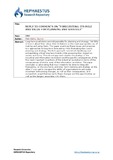| dc.contributor.author | Makridakis, Spyros | |
| dc.date.accessioned | 2015-12-07T15:18:32Z | |
| dc.date.available | 2015-12-07T15:18:32Z | |
| dc.date.issued | 1996 | |
| dc.identifier.issn | 0169-2070 | |
| dc.identifier.uri | http://hdl.handle.net/11728/6351 | |
| dc.description.abstract | Long-term predictions are indispensable for planning and strategy. Yet little is known about their value, their limitations or the most appropriate way of making and using them. This paper examines these issues and proposes two approaches to long-term forecasting while illustrating their use to planning and strategy. The first approach consists of identifying and extrapolating critical long term trends while assessing their impact on society and firms. The second approach studies the analogy of the industrial and information revolutions and the specific consequences of the five most important inventions of the industrial revolution in terms of the consequences of similar ones of the information revolution. The paper concludes by advocating that much needs to be done to integrate forecasting, on the one hand, and long- term planning and strategy on the other if we want to increase the ability of organizations to anticipate important forthcoming changes, as well as their consequences, and successfully adapt themselves to these changes and the opportunities as well as the dangers associated with them. | en_UK |
| dc.language.iso | en | en_UK |
| dc.publisher | Elsevier | en_UK |
| dc.relation.ispartofseries | International Journal of Forecasting;vol. 32 | |
| dc.rights | © 1996 Elsevier Science B.V. | en_UK |
| dc.rights.uri | http://creativecommons.org/licenses/by-nc-nd/4.0/ | en_UK |
| dc.subject | Research Subject Categories::SOCIAL SCIENCES::Business and economics | en_UK |
| dc.subject | Research Subject Categories::SOCIAL SCIENCES | en_UK |
| dc.subject | Forecasting | en_UK |
| dc.title | Reply to comments on "Forecasting: its role and value for planning and strategy" | en_UK |
| dc.type | Article | en_UK |
| dc.doi | 10.1016/S0169-2070(96)90043-6 | |


